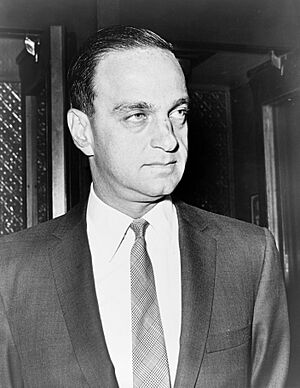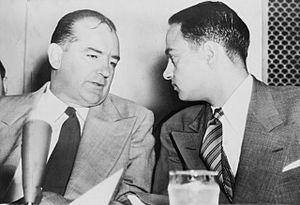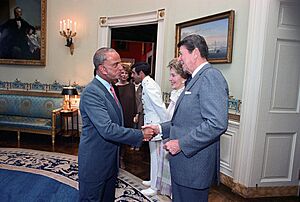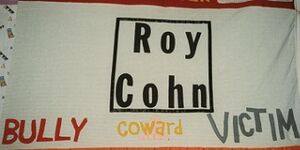Roy Cohn facts for kids
Quick facts for kids
Roy Cohn
|
|
|---|---|

Cohn in 1964
|
|
| Born |
Roy Marcus Cohn
February 20, 1927 New York City, U.S.
|
| Died | August 2, 1986 (aged 59) Bethesda, Maryland, U.S.
|
| Education | Columbia University (BA, LLB) |
| Occupation | Lawyer |
| Known for |
|
| Political party | Democratic |
| Parent(s) |
|
| Family | Joshua Lionel Cowen (great-uncle) |
Roy Marcus Cohn was an American lawyer and prosecutor. He was born on February 20, 1927, and passed away on August 2, 1986. Cohn became well-known for his work with Senator Joseph McCarthy. He was McCarthy's main lawyer during the Army–McCarthy hearings in 1954. In this role, he helped McCarthy investigate people thought to be communists.
Later in his career, in the 1970s and 1980s, Cohn became a powerful lawyer in New York City. He also worked for and advised Donald Trump early in Trump's business career. Cohn was born in The Bronx, New York City, and studied at Columbia University. He first gained fame as a prosecutor in the trial of Julius and Ethel Rosenberg. He successfully prosecuted the Rosenbergs, who were accused of spying.
After his time with McCarthy, Cohn's public image changed. In 1986, he was no longer allowed to practice law because of his actions. He died a few weeks later from a serious illness.
Contents
Early Life and Education
Roy Cohn grew up in a wealthy Jewish family in the Bronx, New York City. He was the only child of Dora Marcus and Justice Albert C. Cohn. His father was a judge. Roy's great-uncle was Joshua Lionel Cowen, who started the famous toy train company, Lionel Corporation.
Roy and his mother were very close. They lived together until she passed away in 1967. She cared a lot about his school grades and how he looked. Roy's grandfather, Joseph S. Marcus, started the Bank of United States. The bank failed during the Great Depression.
Cohn went to Fieldston School and the Horace Mann School. He then finished his studies at Columbia University in 1946. He graduated from Columbia Law School when he was only 20 years old.
Starting His Law Career
After law school, Cohn worked for the U.S. Attorney's office in New York. In May 1948, at age 21, he became a lawyer. He was made an assistant U.S. attorney that same month. Cohn also joined the board of the American Jewish League Against Communism.
As an assistant U.S. attorney, Cohn helped convict people accused of being Soviet spies. One important case was in 1950. It involved William Remington, a former government employee. Remington was accused of lying about being a member of the Communist Party.
Cohn also helped with a case against 11 leaders of the American Communist Party. They were accused of planning to overthrow the U.S. government.
The Rosenberg Trial
Cohn played a big part in the 1951 spying trial of Julius and Ethel Rosenberg. Cohn questioned Ethel's brother, David Greenglass. Greenglass's testimony was key to the Rosenbergs being found guilty. He said he helped his brother-in-law spy. He claimed he carried secret documents stolen from the Manhattan Project.
Later, Greenglass changed his story. He said he lied during the trial to protect himself and his wife. Cohn was always proud of the Rosenberg verdict. He even claimed his influence led to the main prosecutor and judge being chosen for the case. Cohn said the judge gave the death penalty based on his advice.
Most historians agree that Julius Rosenberg was a spy against the U.S. However, they also believe the trial had problems. Many think Cohn's actions as a prosecutor were unfair.
Working with Joseph McCarthy
The Rosenberg trial brought the 24-year-old Cohn to the attention of J. Edgar Hoover, the head of the FBI. With support from Hoover, Senator Joseph McCarthy hired Cohn as his main lawyer. Cohn helped McCarthy with his work for the Senate Permanent Subcommittee on Investigations. He became known for his tough questioning of people suspected of being Communists.
Cohn preferred to hold meetings in private. This fit well with McCarthy's style. They wanted to avoid public attention. Cohn was given a lot of freedom in his investigations. McCarthy only joined for the more public sessions.
Cohn was very involved in McCarthy's anti-Communist hearings. During this time, Cohn and McCarthy claimed that foreign spy services were blackmailing U.S. government workers. They said these workers were forced to spy because their homosexuality could be exposed. President Dwight Eisenhower then signed an order banning homosexuals from federal jobs. Cohn himself was gay, but he always denied it.
Cohn and McCarthy were responsible for many gay men losing their government jobs. They also used rumors of homosexuality to silence their opponents.
Cohn introduced G. David Schine to McCarthy's team. Schine was an anti-Communist writer. When Schine was drafted into the US Army, Cohn tried hard to get him special treatment. He even threatened to "wreck the Army" if his demands were not met. This led to the Army–McCarthy hearings in 1954. The Army accused Cohn and McCarthy of using improper pressure. McCarthy and Cohn said the Army was holding Schine "hostage." These hearings eventually led to McCarthy being criticized by the Senate. After this, Cohn left McCarthy's staff and started his own law practice in New York.

Law Career in New York City
After leaving McCarthy's staff, Cohn worked as a lawyer in New York City for 30 years. He had many famous clients. These included Donald Trump and George Steinbrenner, who owned the New York Yankees. He also represented owners of the famous club Studio 54.
Cohn was known as a "fixer." This meant he was good at solving problems for his clients, often behind the scenes. He was charged three times with professional misconduct. This included lying and trying to influence witnesses. He was also accused of financial problems related to city contracts. However, he was found not guilty on all charges.
Political Activities
In 1979, Cohn joined the Western Goals Foundation. He was on its board of directors. Even though he was a registered Democrat, Cohn supported most Republican presidents. He had strong connections in conservative political groups. He advised presidents like Richard Nixon and Ronald Reagan. At the same time, he also had close ties to important Democrats in New York.
In 1972, he helped Nixon by sharing medical records of George McGovern's running mate, Thomas Eagleton. The records showed Eagleton had been treated for depression. This helped Nixon win the election.
Cohn also worked on Reagan's 1980 presidential campaign. He became friends with Roger Stone. Cohn helped Stone arrange for another candidate, John B. Anderson, to get a nomination from a smaller party. This helped split the votes against Reagan in New York. Reagan won the state.
Working for Donald Trump and Rupert Murdoch
In 1973, the U.S. Justice Department accused Donald Trump of breaking the Fair Housing Act. This law prevents discrimination in housing. The government said Trump's company treated African Americans differently when they tried to rent apartments. Cohn represented Trump. He filed a lawsuit against the government, saying the charges were false. Trump settled the case out of court in 1975.
Cohn was also involved in building Trump Tower. At the time, there was a strike by construction workers. Cohn had represented powerful figures in the past. When Donald Trump needed concrete, he got it from a union leader linked to these figures.
Rupert Murdoch, a media owner, was also a client of Cohn's. Cohn often asked President Ronald Reagan to help Murdoch's business interests. Cohn is also credited with introducing Trump and Murdoch in the mid-1970s. This started a long relationship between the two men.
Lionel Trains Company
Roy Cohn was the grandnephew of Joshua Lionel Cowen, who founded the Lionel Corporation, a model train company. By 1959, Cowen and his son were having a family disagreement over who would control the company. In October 1959, Cohn and a group of investors took control of the company. They bought many shares from the Cowens and on the stock market.
Under Cohn's leadership for three and a half years, Lionel faced problems. Sales went down, and there were issues with the quality of the products. The company also lost a lot of money. In 1963, Cohn was forced to leave the company after losing a fight for control.
End of Career and Life
In 1986, a group of five judges decided that Cohn could no longer practice law. They said he acted unethically and unprofessionally. This included misusing clients' money and lying on a legal application. One specific charge was about him trying to change a dying client's will in his favor. He tried to make the client sign a document that would give Cohn a fortune. The court found the signature was not valid.
Despite being disbarred, many famous people spoke up for Cohn. These included TV host Barbara Walters and Donald Trump.
In 1984, Cohn was diagnosed with a serious illness. He tried to keep his condition a secret. He died on August 2, 1986, at age 59, from complications of this illness. After his death, the government seized almost everything he owned. This included his house, cars, and bank accounts. Roy Marcus Cohn was buried in Union Field Cemetery in Queens, New York. His tombstone says he was a lawyer and a patriot.
Personal Connections
Cohn dated Barbara Walters in college, and they remained friends. Si Newhouse, who inherited the Condé Nast publishing company, was Cohn's classmate. They were lifelong friends. Cohn also called Generoso Pope a "second father."
Cohn and FBI director J. Edgar Hoover exchanged Christmas gifts. They also went to parties with their friend, Lewis Rosenstiel, who started a liquor company. Cohn called Donald Trump his best friend. Cohn told reporters that Trump called him many times a day. According to Cohn's long-time phone operator, Trump was the last person to speak to Cohn before he died.
Cohn had many important social contacts. His operator said he often spoke with Nancy Reagan. She also said former CIA director William Casey called Roy almost daily during Reagan's first election. Both Casey and Cohn were reportedly close with Craig J. Spence, a Republican lobbyist. Cohn met Alan Dershowitz when they worked on a case together. Cohn was also friends with Estée Lauder and New York City mayor Abraham Beame.
What People Thought of Roy Cohn
In 1978, Ken Auletta wrote about Cohn in Esquire magazine. He said Cohn fought his cases as if they were his own. He described Cohn as a "legal executioner." He called him "the toughest, meanest, loyalest, vilest, and one of the most brilliant lawyers in America."
Maureen Dowd wrote in The New York Times about a film about Cohn. She said Roy Cohn understood how to use patriotism for his own gain. He knew how to get the press to write about him. He was like a "caged animal" who would attack if the cage door opened.
Many people believe Cohn had a big impact on Donald Trump's presidency. Ivy Meeropol, a filmmaker, said Cohn "paved the way for Trump." She said he introduced Trump to people like Paul Manafort and Roger Stone. These people later helped Trump get to the White House.
Marie Brenner wrote in Vanity Fair about Cohn advising Trump. She said Cohn had a very sharp mind. He could keep a jury interested. When he was accused of bribery, his lawyer had a heart attack. Cohn then stepped in and gave a seven-hour closing argument without notes. When Cohn spoke, he would stare at you with his pale blue eyes.
Roy Cohn in Media
Roy Cohn's life has inspired many fictional stories after his death.
Plays
Perhaps the most famous portrayal is in Tony Kushner's play Angels in America (1991). This play shows Cohn as a powerful person who hides his true self. He is haunted by the ghost of Ethel Rosenberg as he denies his illness. In the original Broadway play, Ron Leibman played Cohn. In the HBO miniseries (2003), Al Pacino played Cohn.
Cohn is also a character in Kushner's short play, G. David Schine in Hell (1996). This play might have been inspired by a comic strip called "Roy Cohn in Hell."
Movies and TV Shows
Cohn was the subject of two documentaries in 2019. These were Bully, Coward, Victim: The Story of Roy Cohn and Where's My Roy Cohn?
Other movies and TV shows where Cohn is portrayed include:
- Jeremy Strong in The Apprentice (2024)
- James Woods in Citizen Cohn (1992)
- Joe Pantoliano in Robert Kennedy and His Times (1985)
- George Wyner in Tail Gunner Joe (1977)
David Moreland plays Cohn in The X-Files episode "Travelers" (1998). In 2022, Cohn is played by Will Brill in the Showtime miniseries Fellow Travelers.
A dishonest lawyer named Roland Blum, played by Michael Sheen, is inspired by Cohn. He appears in an episode of The Good Fight.
Cohn is also mentioned in the Billy Joel song "We Didn't Start the Fire".
 | James Van Der Zee |
 | Alma Thomas |
 | Ellis Wilson |
 | Margaret Taylor-Burroughs |



